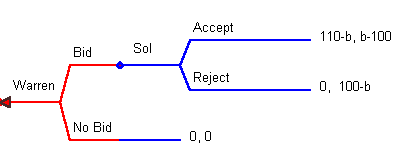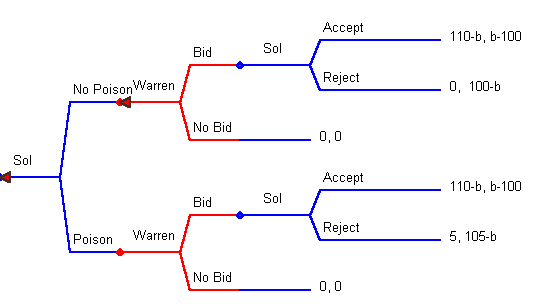
Takeovers and Poison Pills
The conventional wisdom in economics is that failure to maximize profits lowers the stock value of a firm and that it induces 'raiders' to buy the firm, replace its management and direct the firm toward higher profits (Manne(1965)1 and Marris(1964)2). For the argument to hold water, then upon takeover managers must either be punished or lose through dismissal rents they had enjoyed as managers.
Takeovers

Warren Peace is an investor with mucho dinero. Warren has his eye on a publicly held firm, Motion Potions, managed by Sol E. Tude. The current share price of Motion Potions is $100. It is Warren's belief that if he can get control of the firm, then under his skilled management the value of the firm will rise to $110 per share.
Warren can make a bid $100 < b < $110 that may or may not be accepted by Sol. If the bid is accepted by Sol then Warren will make $110 - b per share as the new owner. Sol will make b - $100. b is what he receives for each share, but he foregoes the $100 he would have made by retaining control of the firm.
What happens when Sol rejects the bid? Warren's payoff when the bid is rejected is zero. But this isn't the end of the story. In this event then Sol must purchase the shares that shareholders would have liked to sell to Warren. Sol's payoff is now $100 - b.
We can now draw the game tree.

Warren's payoff is the first entry and Sol's is the second entry. Suppose that Warren bids $105, then Sol will accept the offer; he prefers to make $5 rather than lose $5. Working backwards, Warren will then see that he does better by making the bid. What happens if the bid is exactly $100? What happens if the bid is $110?
Poison Pills 
What's a poor manager to do? Suppose you rather enjoy the perquisites of running the company, but have been satisficing rather than profit maximizing, making your firm a target for takeover.
Deterrents to takeover are broadly construed as poison pills.
There are many ways in which incumbent management can protect themselves from
the fallout of a takeover.
Golden parachutes - in which
management requires that the raider pay them handsomely to retire from the
firm. If this compensation is too great then the raider may move on.
Increasing the firm's debt load has
the effect of decreasing shareholder value since it will be more difficult to
service the increased liability.
Preferred stock rights confers special
voting privileges on this special class of common stock, thereby preventing the
raider from acquiring control of the board.
Greenmail in the form of
the target firm purchasing the raider's shares in the target company at an inflated
price with a covenant requiring the raider to stand still, i.e. acquire no new
shares nor interfere with management for a period of time. Saul Steinberg,
as owner of Reliance Insurance, made about $86 millions in this way on raids on
Disney, Quaker State, Penn Central and Lomas Financial. In the case of
Disney, Steinberg repaid Disney investors. On the other hand, the raid did
prompt the board to replace Miller with Eisner. Another example is provided by Goodyear.
In this takeover game with a poison pill the payoffs at the end of the game are organized as before. The first entry is the payoff for Warren and the second entry is the payoff for Sol.

The payoffs in the top half the game are the same as in the previous game and need no further explanation.
In the bottom half the game Sol has implemented a poison pill provision in the corporate charter. If Warren bids and Sol accepts the bid then the payoff to Warren is $110-b and the payoff to Sol is b-100. The payoffs are the same because although there is a pill provision, it is not implemented when Sol (management) accepts the offer. Again in the bottom half, if Warren bids and Sol rejects the bid then Warren's payoff is $5. This is in the nature of greenmail. Sol (management) pays Warren to lift the siege and go away. But that is not all. Upon hearing that the bid has been rejected shareholders will expect Sol to worker harder and increase shareholder value and so the payoff to Sol will be $105-b. For what values of b will there be no poison pill and a successful takeover by Warren? For what values of b will the solution to the game be a poison pill, an offer by Warren, and a rejection of the offer by Sol? What outcome would shareholders prefer? What have you learned about using commitment to steer the game toward an outcome preferred by one of the players?
1. H. Manne. 1965. Mergers and the Market for Corporate Control, Journal of Political Economy 73: 110-120.
2. R. Marris. 1964. The Economic Theory of Managerial Capitalism. London: Macmillan.
3. DiStefano, J.N. (2001), "Life is Grand" Philadelphia Inquirer Magazine, Pps. 16-21, December 16, Philadelphia.